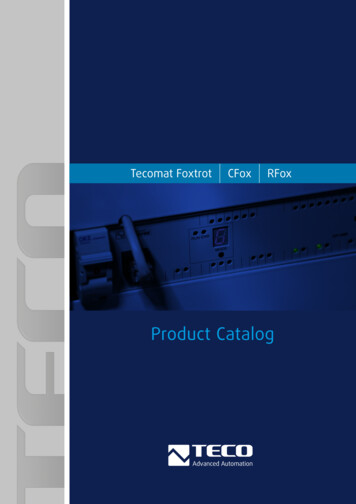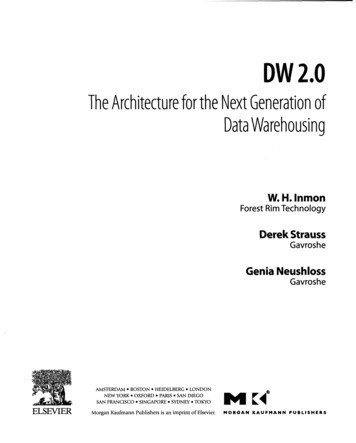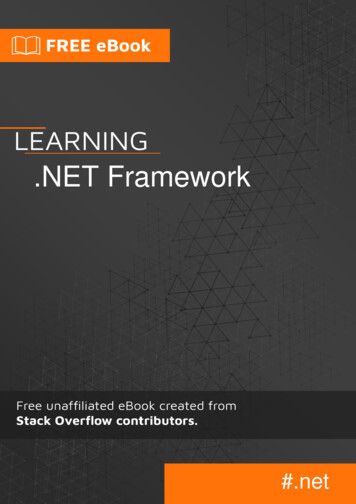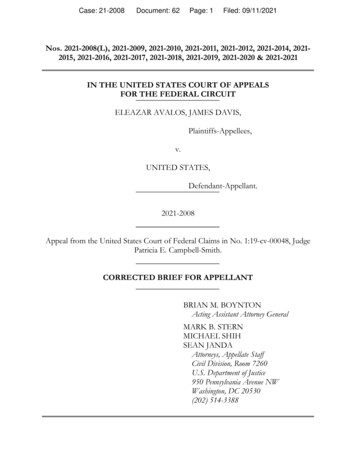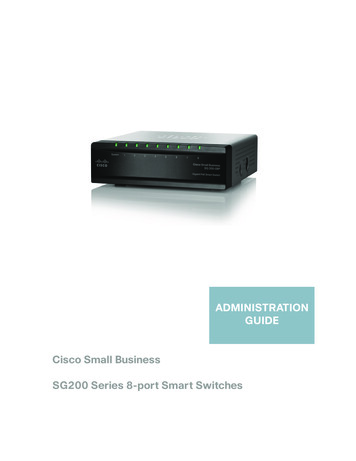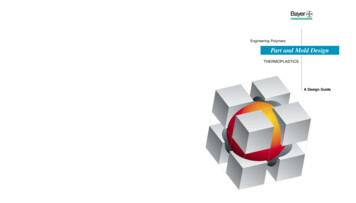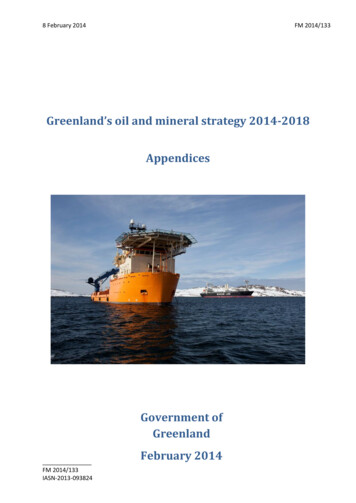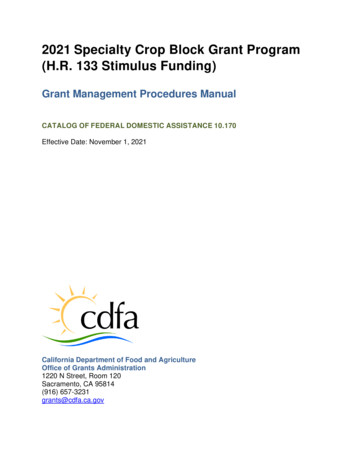
Transcription
2021 Specialty Crop Block Grant Program(H.R. 133 Stimulus Funding)Grant Management Procedures ManualCATALOG OF FEDERAL DOMESTIC ASSISTANCE 10.170Effective Date: November 1, 2021California Department of Food and AgricultureOffice of Grants Administration1220 N Street, Room 120Sacramento, CA 95814(916) 657-3231grants@cdfa.ca.gov
This page intentionally left blank.2021 Specialty Crop Block Grant Program (H.R. 133 Stimulus Funding)California Department of Food and Agriculture
Table of ContentsOverview. 1Authority and Program Purpose . 1Purpose of the Grant Management Procedures Manual . 1General Responsibilities . 1Office of Grants Administration . 1Grant Recipients . 1Recipient Resources . 1Prior Approval Required . 2Project Management . 3Compliance with Federal Requirements . 3Enhancing the Competitiveness of Specialty Crops . 3Allowable Costs . 3Unallowable Costs . 4Direct and Indirect Costs . 4Indirect Cost Rate . 4Charging Direct and Indirect Costs Consistently . 4Scope of Work Revisions . 5Line Item Shift Requests . 6Notification of Problems and Delays . 7One-Time Extension . 7Program Income . 7Cost Share. 8Timekeeping Requirements . 8Travel . 8Restriction on Travel to States with Discriminatory Laws . 8Domestic Travel . 9Foreign Travel . 9Ground Transportation . 9Parking . 10Air Travel . 10Contractors/Consultants . 10Competitive Process . 11Written Agreement . 11Compensation . 11Equipment . 12Publicity and Acknowledgment . 12Publicity . 122021 Specialty Crop Block Grant Program (H.R. 133 Stimulus Funding)California Department of Food and Agriculture
Acknowledgment of Support . 12Invoicing . 14Payment Methods. 14Advance Payments . 14Reimbursement Payments . 15Invoices . 15When to Submit Invoices. 15Completing an Invoice . 15Withholds . 16Withhold Payment Notification . 16Withhold Pending Closeout . 16Reporting Requirements . 17Progress Report . 17Final Report . 17Single Audit Requirements . 17Compliance and Remedies for Noncompliance . 18Compliance Reviews . 18Remedies for Noncompliance. 18Additional Conditions . 19Termination of Grant Agreement . 19Appeal Process . 19Closeout . 21Property Management and Disposition . 21Intellectual Property . 21Special Purpose Equipment . 21Property Records . 21Disposition of Special Purpose Equipment and Supplies . 22Record Retention. 222021 Specialty Crop Block Grant Program (H.R. 133 Stimulus Funding)California Department of Food and Agriculture
OverviewAuthority and Program PurposeThe 2021 Specialty Crop Block Grant Program (SCBGP) is authorized by section 101 ofthe Specialty Crops Competitiveness Act of 2004 (7 U.S.C. 1621 note) of Public Law108-465; amended under section 10107 of the Agricultural Improvement Act of 2018(Farm Bill), Public Law 115-343.In addition to the regular SCBGP funding authorized by the Farm Bill the United StatesCongress has awarded additional one-time SCBGP funding to state departments ofagriculture due to the COVID-19 impacts on the food system under House Resolution133 (H.R. 133 Stimulus Funding).The purpose of the SCBGP is to enhance the competitiveness of specialty crops.Specialty crops are fruits, vegetables, tree nuts, dried fruits, horticulture, and nurserycrops (including floriculture). Visit USDA’s “What is a Specialty Crop” website for a list ofeligible and ineligible commodities.Purpose of the Grant Management Procedures ManualThe 2021 SCBGP (H.R. 133 Stimulus Funding) Grant Management Procedures Manual(GMP) is designed to provide direction to Grant Recipients (Recipients) for thesuccessful management of SCBGP federally funded projects. The GMP identifies theroles and responsibilities of all parties and describes the processes and proceduresrequired by the terms and conditions in the Grant Agreement.General ResponsibilitiesOffice of Grants AdministrationThe California Department of Food and Agriculture (CDFA), Office of GrantsAdministration (OGA) manages the SCBGP Grant Agreements and ensures Recipientsare compliant with applicable federal regulations and requirements and grant terms andconditions. The OGA also provides Recipients with technical assistance throughout theGrant Agreement term.Grant RecipientsRecipients implement the Grant Agreement scope of work and ensure all projectactivities, including contractor/consultant activities, comply with applicable federalregulations and requirements and grant terms and conditions.Recipient ResourcesForms and templates referenced in this manual, as well as other resources, can befound on the CDFA SCBGP Recipient Resources page.2021 Specialty Crop Block Grant Program (H.R. 133 Stimulus Funding)California Department of Food and AgriculturePage 1 of 22
Prior Approval RequiredPrior approval is required from OGA, and in some instances USDA, for the following: Revision of the scope of work, objectives, work plan, activities, milestones, dates,or deliverablesBudget changesLine item shiftsPurchase of special purpose equipmentRental of landTravel costs, both domestic and foreign (including costs associated withexchange rates)Contracting out or obtaining the services of a third partyContractor/consultant rates in excess of GS-15, Step 10Fixed amount/flat rate contractsAlcoholic beverages (associated with enhancing the competitiveness of aprocessed product)Farm, gardening, and production activities and suppliesChange in Recipient organization or key personnelAbsence of key personnel, or a reduction of key personnel time committed to theproject of 25 percent or greaterChange or addition of personnel related to administrative and clerical staffsalariesRevision to outcome measures, indicators and/or sub-indicatorsSelling and marketing costsFood for displays, tastings, and cooking demonstrationsParticipant support costso Stipendso Registration fees paid to or on behalf of participants or trainees (but notemployees) in connection with approved conferences, training projects,surveys, and focus groups.Changes to the use of Program Income (if applicable)The information required for a request for approval varies according to the type ofapproval sought. Contact the assigned Grant Analyst for the information required foryour situation.Failure to obtain prior approval may result in costs being deemed unallowable andrequest for reimbursement being denied.2021 Specialty Crop Block Grant Program (H.R. 133 Stimulus Funding)California Department of Food and AgriculturePage 2 of 22
Project ManagementCompliance with Federal RequirementsGuidance for federal awards is published in the Code of Federal Regulations (CFR).The CFR is accessible through the Electronic Code of Federal Regulations atwww.ecfr.gov.Grant funds awarded to state, local, and tribal governments; public and private collegesand universities; and non-profit organizations are subject to the Uniform AdministrativeRequirements, Cost Principles, and Audit Requirements for Federal Awards containedin 2 CFR part 200 and 2 CFR part 400.Grant funds awarded to federal government entities are subject to the UniformAdministrative Requirements and Cost Principles for Federal Awards contained in 2CFR part 200 and 2 CFR part 400.Grant funds awarded to for-profit organizations are subject to the Uniform AdministrativeRequirements contained in 2 CFR part 200 and 2 CFR part 400, and the Cost Principlescontained in the Federal Acquisition Regulation (FAR) Subpart 31.2, Contracts withCommercial Organizations, codified at 48 CFR 31.2.Recipients are responsible for the consistent application of federal regulations to theSCBGP grant funds. Recipients are responsible for ensuring theircontractors/consultants comply with federal regulations.Enhancing the Competitiveness of Specialty CropsSCBGP funding must enhance the competitiveness of specialty crops. Expendituresthat do not enhance the competitiveness of specialty crops are unallowable. Additionalguidance regarding this requirement is available on CDFA’s SCBGP website or from theassigned Grant Analyst.Allowable CostsIn addition to the requirement to enhance the competitiveness of specialty crops, a costis allowable if it directly relates to the approved project and is incurred solely to advancework under the Grant Agreement. Allowable costs may include salaries and wages,fringe benefits, consultant services, travel, special purpose equipment, subcontractorsand materials, data collection and analysis, land or equipment rentals, and training.Expenditures must conform to USDA and CDFA program requirements, be made incompliance with federal and state laws and regulations as applicable, and be: Necessary and reasonable for proper and efficient performance andadministration of the project.Authorized or not prohibited under federal, state or local laws or regulations.2021 Specialty Crop Block Grant Program (H.R. 133 Stimulus Funding)California Department of Food and AgriculturePage 3 of 22
Consistent with policies, regulations, and procedures that apply uniformly to bothfederal and state funds and other activities of the governmental unit.Determined in accordance with generally accepted accounting principles.Adequately documented.Unallowable CostsA cost is unallowable if it does not comply with applicable cost principles, programrequirements, or other terms and conditions of the Grant Agreement. A cost is alsounallowable if it does not benefit specialty crops, is not contained in the approved scopeof work, or is not necessary and reasonable to advance the work of the project.Unallowable costs will not be reimbursed.Specific expenses that are unallowable include, but are not limited to, costs that benefitnon-specialty crops, sponsorships, hospitality suites, incentives, donations, gifts,giveaways, alcoholic beverages (except when the costs are associated with enhancingthe competitiveness of a processed product), costs of entertainment (includingamusement, diversion and social activities, and any costs directly associated with suchcosts such as tickets to shows or sports events, meals, alcoholic beverages forcelebratory purposes or personal consumption, lodging, rentals, transportation, andgratuities), costs associated with promoting an organization or membership building,costs associated with lobbying, costs for organized fundraising including financialcampaigns and solicitation of gifts, and all costs associated with travel to a state withdiscriminatory laws including all conference costs and registration fees (see Restrictionon Travel to States with Discriminatory Laws on page 8).Additional guidance regarding allowable and unallowable costs and activities isavailable on CDFA’s SCBGP website or from the assigned Grant Analyst.Direct and Indirect CostsIndirect Cost RateIndirect costs are limited to a maximum of eight percent (8%) of the total amount ofSalary and Wages plus Fringe Benefits. Indirect costs may not be increased from theoriginally approved budget amount. This also applies to the Recipient’scontractors/consultants.Charging Direct and Indirect Costs ConsistentlyRecipients are prohibited from charging an indirect cost as a direct cost. Recipients areresponsible for presenting costs incurred for the same purpose in like circumstancesconsistently and must not include costs associated with their organization’s indirect costpolicy as direct costs.2021 Specialty Crop Block Grant Program (H.R. 133 Stimulus Funding)California Department of Food and AgriculturePage 4 of 22
Direct costs are costs that can be identified specifically with a particular project or canbe directly assigned to a project activity relatively easily with a high degree of accuracy.Typically, direct costs include, but are not limited to, compensation for employees whowork directly on the project, travel, equipment, and supplies necessary to the project.Indirect costs (also known as “facilities and administrative costs”) are costs incurred fora common or joint objective that cannot be identified specifically with a particularproject. Typically, indirect costs include, but are not limited to, compensation forexecutive officers, and administrative and clerical staff, costs of operating andmaintaining facilities, general administration expenses (such as supplies that cannot beidentified specifically with a particular project), accounting and personnel services,depreciation, and insurance.The salaries of administrative and clerical staff should normally be treated as indirectcosts. However, direct charging of these costs may be appropriate where all of thefollowing conditions are met:1.2.3.4.Administrative or clerical services are integral to the project or activity;Costs involved can be specifically identified with the project or activity;Such costs are explicitly included in the approved budget; and,The costs are not also recovered as indirect costs.All criteria above must be met before a determination can be made whether the costsare allowable as direct costs. Approval must also be obtained from OGA, and USDA.Compliance with other requirements, such as timekeeping requirements, must also bemet.The following are considered indirect and should not be charged to the grant as directcosts: Information technology servicesRentUtilities and internet serviceTelephone service (mobile and land-line)General office suppliesInsurance and indemnificationScope of Work RevisionsScope of Work (SOW) revisions are required when changes to activities, milestones,dates, deliverables, support from other grant programs, and/or budget occur. Requestsfor revisions must be made in writing and provide sufficient information to explain theneed and how the change affects the project. Revisions must be requested by anauthorized official of the Recipient organization, and approved by OGA, and in someinstances USDA. Reimbursement is available only for approved project activities.2021 Specialty Crop Block Grant Program (H.R. 133 Stimulus Funding)California Department of Food and AgriculturePage 5 of 22
Failure to obtain prior approval of SOW revisions may result in costs being deemedunallowable and request for reimbursement denied.Examples of project changes that require a SOW revision include, but are not limited to: Changes within the budget line items (addition, deletion, or revision of personnel,contractors/consultants, travel, supplies, etc.).Transfer of project work to a third party through a contract, sub-grant, or anyother means.Replacement or changes in the status of the Principal Investigator or ProjectDirector such as withdrawing from the project entirely, being absent during anycontinuous period of three months or more, or reducing the time base by 25percent or more.The addition, deletion, or revision of activities and/or deliverables.Change of Recipient, Recipient organization name, or Recipient organizationalstatus.Changes to the outcome measures, indicators or sub-indicators.The Recipient receives grant funds to support similar project costs/activities fromanother federal or state grant program.The Recipient receives federal or state assistance to support costs that are alsosupported with SCBGP funds (e.g. a forgiven loan from the Paycheck ProtectionProgram or a California Small Business COVID-19 Relief Grant).Consult with the assigned Grant Analyst for further instructions on completing a SOWrevision.Line Item Shift RequestsIn the event a change to the projects budget line items is necessary, Recipients arerequired to complete and submit to OGA a SOW revision along with a Line Item ShiftRequest (LISR) in advance to adjust budget line items. Approval for the LISR must beobtained from OGA prior to incurring costs under the revised budget.The following restrictions and requirements apply to LISRs: The project award amount cannot be increased or decreased through thisprocess.The indirect budget line item cannot be increased from the originally approvedbudget amount. If total personnel costs decrease, the indirect budget line itemmust be decreased accordingly.LISRs must be accompanied by a SOW revision.Note: Recipients may have multiple LISRs throughout the Agreement Term.2021 Specialty Crop Block Grant Program (H.R. 133 Stimulus Funding)California Department of Food and AgriculturePage 6 of 22
Notification of Problems and DelaysRecipients must immediately notify OGA of any delays, problems, and/or adverseconditions that may materially affect the project. Examples include but are not limited to:inability to collect data, conduct research, or complete any activity according to the workplan or work plan schedule; substituting commodities identified in the work plan; inabilityto fill vacant positions resulting in activities being delayed or eliminated. Some problemsand delays may require a SOW revision.One-Time ExtensionRecipients may request a one-time extension of up to 90 calendar days if the projectcannot be completed within the agreement term established in the Grant Agreement. Aone-time extension cannot result in the agreement term extending beyond June 30,2025. The request must be submitted, in writing, to the assigned Grant Analyst no laterthan 30 calendar days prior to the end of the agreement term. CDFA will not acceptrequests in the first year of the agreement term. The request must include the following: The length of additional time requested, not to exceed 90 calendar days;A justification for the extension;A summary of the progress of the project since the most recent progressreport;A SOW revision that includes a revised work plan with a new timetable forcompleting the project along with any changes required to the budget; andA LISR (if necessary).Requests for a one-time extension will be reviewed on a case-by-case basis.Extensions will only be granted when the Recipient can demonstrate that the projecthas been delayed due to extraordinary circumstances. For example, failure to expendall grant funds or timely hire of staff are not, by themselves, sufficient justification toreceive a no-cost time extension.Program IncomeProgram income is earned by the Recipient from activities supported by or as a result ofthe grant. The authorized use of Program income for the SCBGP is Addition (reference2 CFR 200.307(e)(2)). Program income must be reinvested into the project to furtherenhance the project objectives and must be expended on allowable project costs thatenhance the competitiveness of specialty crops. Recipients are prohibited from retainingprogram income as profit or funding for the Recipient. Program income may not be usedto support unallowable costs or activities.2021 Specialty Crop Block Grant Program (H.R. 133 Stimulus Funding)California Department of Food and AgriculturePage 7 of 22
Program income is reported on invoices, progress reports, and final reports. Reportingon progress and final reports includes the nature or source of the program income (e.g.,registration fees), the amount, and a description of how the program income was used.Changes to the use of program income require prior approval.Cost ShareCost share refers to matching funds and/or in-kind contributions. The Recipient mustnotify the Grant Analyst if the amount or activities covered by cost share has changed.Cost share is reported on invoices, progress reports, and final reports. Reporting onprogress and final reports includes the type of cost share (i.e., matching funds or in-kindcontributions) and the amount.Timekeeping RequirementsActivity reports are required to support salary and wage and fringe benefit expenditurescharged to SCBGP grants. Each report must account for the total activity for which eachemployee is compensated, as well as the hours worked on a particular SCBGP grantproject. A description of activities must be included, and the description must includeenough detail to determine whether the activity is project-related. This also applies tosalaried employees, such as Executive Directors (reference 2 CFR 200.430). Costs notadequately supported are unallowable and will not be reimbursed. Exception:Institutions of higher education are required to maintain time and effort certificationreports to support salary and wage, and fringe benefits to confirm the expended efforton specific projects in accordance with their established policy.TravelAll travel costs must be substantiated by receipts. Costs not substantiated by receiptsare considered unallowable and will not be reimbursed. Credit card statements are notacceptable as receipts to support travel costs.Prior approval is required for both domestic and foreign travel. Please see PriorApproval Required on page 2 and Scope of Work Revisions on page 5.Restriction on Travel to States with Discriminatory LawsCalifornia Assembly Bill 1887 (2016) prohibits the use of state-funded or statesponsored travel to any state that has enacted discriminatory laws or practices. TheAttorney General will maintain a current list of states that are subject to the travelprohibition on its website: https://oag.ca.gov/ab1887. Costs associated with travel to thestates affected by this restriction are unallowable.2021 Specialty Crop Block Grant Program (H.R. 133 Stimulus Funding)California Department of Food and AgriculturePage 8 of 22
Domestic TravelReimbursement is for actual costs up to the maximum allowance for meals, incidentals,and lodging expenses for each complete 24 hours of travel. The maximum travel ratesallowable are the lesser of the rates in effect at the time of travel as established by theUnited States (U.S.) General Services Administration (GSA), or the Recipient’sestablished travel policy. Exception: Institutions of higher education must follow theirestablished travel policy.Luxury accommodations include lodging at all-inclusive hotels/resorts or multi-bedroomsuites are never appropriate using federal funds. Luxury accommodations or otherforms of lodging that exceed the GSA rate, even when travel involves multipleindividuals sharing a single accommodation such as a suite, are unallowable.Foreign TravelReimbursement is available for actual costs up to the maximum allowance for meal,incidental, and lodging expenses when traveling out of the country. The maximuminternational travel rates allowable are established in a supplement to section 925, U.S.Department of State Standardized Regulations. These per diem rates are available onthe U.S. Department of State website.Rates are subject to change daily to account for currency and economic changes. Reimbursement for meals and lodging plus incidental travel expenses will bepaid up to the rates identified on the U.S. Department of State’s website.The lodging allowance is intended to substantially cover the cost of lodging atadequate, suitable and moderately priced facilities.Travelers are advised to request information on hotel discounts for Recipientstraveling on U.S. Government business.Ground TransportationRental VehicleRecipients should utilize the most economical rental vehicle option available.Reimbursement is up to the actual cost. Excessive costs will be disallowed and/orreduced to a reasonable, allowable rate. In cases where there is a need for another typeof vehicle (such as several people traveling together with luggage or carryingequipment), the Recipient must provide a justification to the Grant Analyst.Fuel reimbursement when using a rental vehicle will be at the actual cost for the fueland must be supported with receipts.Privately Owned VehicleMileage reimbursement for using a privately owned vehicle will be at the standardmileage rate established by the U.S. Internal Revenue Service in effect at the time oftravel. Mileage logs should be utilized to substantiate mileage costs.2021 Specialty Crop Block Grant Program (H.R. 133 Stimulus Funding)California Department of Food and AgriculturePage 9 of 22
Rideshare ServiceRecipients should utilize the most economical rideshare service (e.g., Uber, Lyft,taxicab) option available. Reimbursement will be at the actual cost and must besupported with receipts.Note: Travel by a luxury vehicle such as a limousine is never appropriate using federalfunds and will not be reimbursed.ParkingRecipients should utilize the most economical parking option available. Reimbursementfor parking is up to the actual cost and must be supported with receipts. Excessive costswill be disallowed and/or reduced to a reasonable, allowable rate.Air TravelAll travelers must use economy-based rates for airfare. Reimbursement is available upto the actual airfare expenses incurred and must be supported with receipts. Thefollowing costs related to air travel are unallowable and will not be reimbursed: Upgraded seatsPriority boardingExcessive b
The 2021 SCBGP (H.R. 133 Stimulus Funding) Grant Management Procedures Manual (GMP) is designed to provide direction to Grant Recipients (Recipients) for the successful management of SCBGP federally funded projects. The GMP identifies the roles and responsibilities of all parties and describes the processes and procedures
